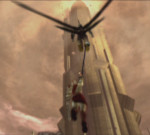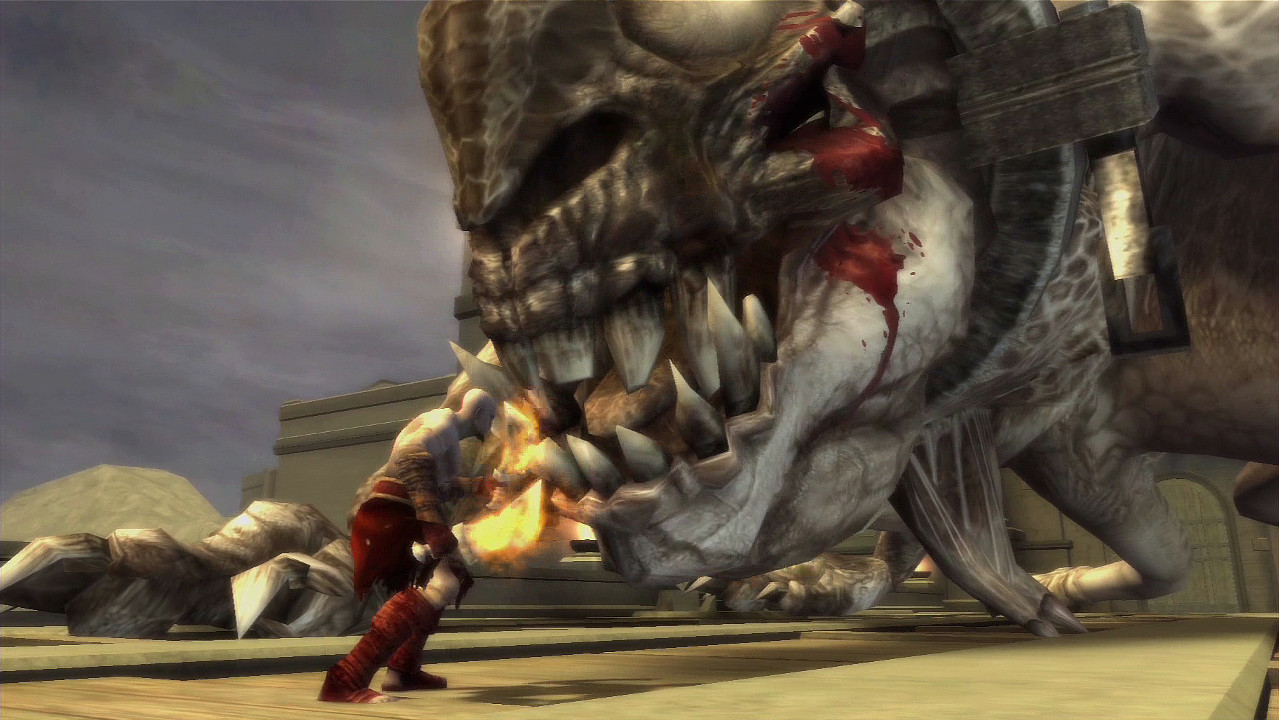THE END, WHERE ALL THE PLOT IS

At many points during the game (mostly when near the fog of Morpheus), Kratos hears a haunting flute melody. Eventually, he recognizes it as the song of his daughter, Calliope, whom he murdered accidentally. One would think that this was some sort of demoralization tactic by Morpheus or something, but the song can also be heard as the ferry nears its destination. It’s rather confusing, and it led me to believe that Calliope’s flute was initially being played for no reason. Ultimately, it’s a flimsy reminder to establish that Kratos had a daughter, and she owns a flute. When Charon’s ferry arrives at its destination, the Temple of Persephone, we can confirm this: Kratos sees Calliope playing a flute at the dock. She runs away, leading Kratos to follow her through the dangerous, monster-filled temple.

On the other side of the temple is the Elysian Fields, which is the Greek mythological version of Heaven. Here, all of the plot in the game seems to happen at once. At the entrance to the fields, Kratos finds Persephone, the unwilling goddess-queen of the underworld. She confirms that Calliope lives in the Elysian Fields (who let her out?), and reminds Kratos that he still has a job to do for the slumbering Olympians. Of course, he doesn’t care; Kratos shouts at Kratos-volume that he’s fed up with the demands of the gods, and just wants to see his daughter. Persephone tells Kratos that in order to enter Elysium, he must cast his weapons at the Forsaken Tree, and let it release the evils of his past. This isn’t a very steep entry fee for Kratos, as it’s pretty much everything he really wanted from the gods. So, Kratos proceeds to throw his blades at a tree, tug at the chains, and grunt a lot. This somehow strips him of all of his powers, weapons, body paint, and all of that ash, which was supposed to stay on his skin forever. Now that Kratos is just a regular human, he gains access to the Elysian Fields.

Kratos is reunited with Calliope, but Persephone immediately steps in to rain on his parade, and reveals that it was she who released Atlas. Persephone seeks revenge against Olympus for being forced to wed Hades and live in the underworld. Presently, Atlas, with a fistful of Helios, is destroying the pillar that holds up the world. Since Kratos had given up his power, there is nobody left who can prevent him from destroying the world. Furthermore, if the world were destroyed, Elysium would go with it. Kratos, Calliope, and even Persephone would be killed in this event. Persephone is fine with this because she finally gets to decide something, but Kratos has a big decision of his own to make: if he were to stop Atlas, then he would lose Calliope. Kratos fumes and hesitates for a moment, and then the game proceeds into my favorite quicktime event of all time:

Once Kratos successfully tosses Calliope aside, he can begin working towards stopping Persephone and Atlas. Unfortunately, he has no weapons or power to accomplish this. So, what is Kratos to do? The Narrator helpfully chimes in, stating that what Kratos gained in humanity, he lost in power, and would need to become the monster he once was. So, he runs around the Elysian Fields, murdering everyone he sees. As he continues to do so, his weapons and powers spontaneously return to him, one at a time. Eventually, his body paint and ashes return as well. You see, what Persephone didn’t count on when she decided to trap Kratos was that all of his power was derived entirely from metaphor. Perhaps this is the reason why he constantly murders everyone who crosses his path: not just because he’s an asshole, but because it’s the source of his power. After killing enough innocent dead people (and presumably sending them to the Super Elysian Fields), Kratos silently curses his circumstance. He then chases after Persephone, leaving a sobbing Calliope alone in a field full of dead dead people.

Kratos catches up to Persephone, who sprouts wings and flies away. He latches onto her leg with a chain, and is carried to the top of the world-bearing pillar. This begins the final battle with Persephone, where the player experiences an incredibly steep spike in difficulty. Persephone doesn’t have much variety in her attacks, but they are relentless, unblockable, and hard to dodge. Whenever Kratos dies here, you have to watch the scene where he and Persephone fly up to the top of the pillar all over again, and it can’t be skipped. This is easily the most annoying part of the game, and getting through it requires cheap and efficient tactics. Eventually, Persephone will lull Kratos into a stupor, and then order Atlas to smash him. This will start another quicktime event, where Kratos will rather quickly (and by quickly, I mean faster than Kratos in bed) bind Atlas to the world above, driving his chains into the ceiling with the Gauntlet of Zeus. Kratos returns to the tower to finish off Persephone, who is much easier in this phase. As he lands the final blow, Persephone assures him that his suffering will never end, and then explodes in a flash of bright green suffering.

When the dust settles, Kratos has a brief dialogue with Atlas, who is now a substitute world-bearing pillar. Atlas asks Kratos why the gods have not come to his aid. Kratos yells that he doesn’t need their help, but he will serve them until they fulfill their promise, as it’s all he has left. Atlas says they will meet again, because it had already happened in God of War II. The narrator takes over from here, letting us know that Kratos returned the sun chariot to the sky, driving away Morpheus. Also, Kratos will never see Calliope again, and the future is really super difficult for him. The end.



“Our nipples will blot out the sun…” — Xerxes II, Chamberlain of Skeksis
(10/10, would casually slog through reading the whole thing again.)